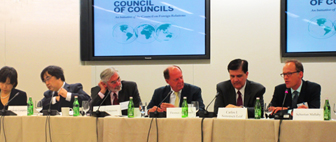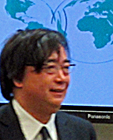Representing Japan, The Genron NPO made its debut in the United States as a member of the Council of Councils (CoC), an international initiative launched by the Washington, D.C.-based Council on Foreign Relations (CFR) to connect leading foreign policy institutes from established and emerging powers around the world in a common conversation on issues of global governance and multilateral cooperation.

In mid-March, Genron NPO Representative Yasushi Kudo and other representatives of the founding CoC member organizations gathered in Washington for a two-day inaugural round-table conference.
The participants comprised leading foreign policy institutions from 19 countries, roughly tracking the composition of the Group of 20 (G-20).The leading opinion leaders exchanged candid views on four major themes: 1) the overall state of global governance and multilateral cooperation; 2) the status of the nuclear non-proliferation regime (with a focus on Iran); 3) the dollar's future as the world's reserve currency; and 4) the criteria for humanitarian intervention, in the wake of regime change in Libya and the ongoing crisis in Syria.

Kudo served as a panelist, along with three other experts, from Canada, Belgium and Brazil, at the session on "the dollar's future as the world's reserve currency."Kudo told the session that, despite diverse uncertain underlining factors, the key international currency setup centering on the U.S. dollar will prevail for some time because in practical terms there is no alternative to it.
As regards the future of the emerging Chinese currency, Kudo expressed a rather cautious view, saying that there are many hurdles for the Chinese currency to overcome before it emerges as a new key international currency and is used extensively as a reserve currency.
"For the Chinese yuan to be internationalized, China must satisfy such requirements as flexibility of foreign exchange transactions and liberalization of capital markets, and more important, independence of the central bank -- a political challenge," he noted.
In the meantime, Kudo warned that the European sovereign debt problem is having negative repercussions on the Asian economy as a whole, and proposed that the pool fund under the Multilateralization Agreement of the Chiang Mai Initiative (CMI), a multilateral currency swap arrangement among all the members of the Association of Southeast Asian Nations (ASEAN), Japan, China and South Korea, be increased as a precaution to ensure the stability of Asian financial markets.
At the same time, he urged Japan and China to provide additional and larger funding to the International Monetary Fund (IMF), so that it would be fully equipped to deal with the European crisis.Responding to a question from the floor, Kudo commented that the question of an alternative to the U.S. dollar as the world's key currency would not be on the agenda for another 20 or 30 years.
When it comes to monetary unification in Asia, he predicted that the birth of a common currency among the ASEAN countries might come first, with the Japanese yen and the RMB joining it later.
Post a comment